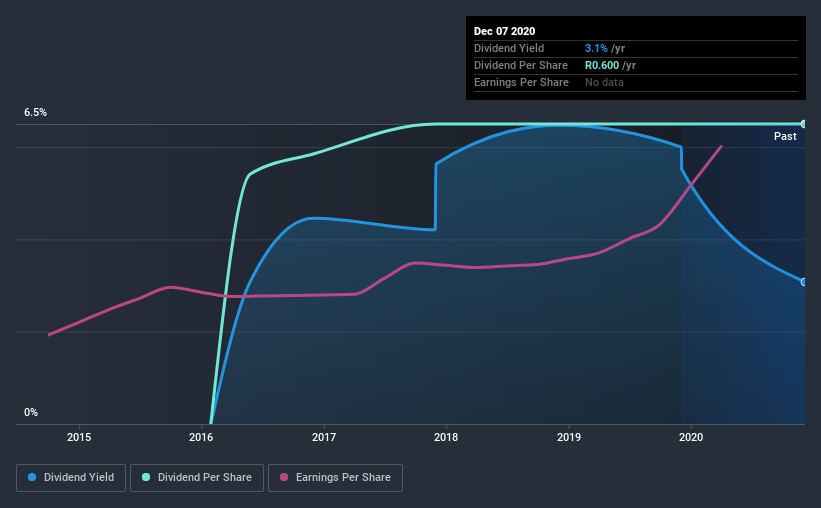- South Africa
- /
- Capital Markets
- /
- JSE:SYG
Here's What You Should Know About Sygnia Limited's (JSE:SYG) 3.1% Dividend Yield
Is Sygnia Limited (JSE:SYG) a good dividend stock? How can we tell? Dividend paying companies with growing earnings can be highly rewarding in the long term. If you are hoping to live on your dividends, it's important to be more stringent with your investments than the average punter. Regular readers know we like to apply the same approach to each dividend stock, and we hope you'll find our analysis useful.
With a goodly-sized dividend yield despite a relatively short payment history, investors might be wondering if Sygnia is a new dividend aristocrat in the making. It sure looks interesting on these metrics - but there's always more to the story. During the year, the company also conducted a buyback equivalent to around 2.4% of its market capitalisation. That said, the recent jump in the share price will make Sygnia's dividend yield look smaller, even though the company prospects could be improving. There are a few simple ways to reduce the risks of buying Sygnia for its dividend, and we'll go through these below.
Click the interactive chart for our full dividend analysis

Payout ratios
Dividends are typically paid from company earnings. If a company pays more in dividends than it earned, then the dividend might become unsustainable - hardly an ideal situation. So we need to form a view on if a company's dividend is sustainable, relative to its net profit after tax. Looking at the data, we can see that 62% of Sygnia's profits were paid out as dividends in the last 12 months. This is a fairly normal payout ratio among most businesses. It allows a higher dividend to be paid to shareholders, but does limit the capital retained in the business - which could be good or bad.
We update our data on Sygnia every 24 hours, so you can always get our latest analysis of its financial health, here.
Dividend Volatility
From the perspective of an income investor who wants to earn dividends for many years, there is not much point buying a stock if its dividend is regularly cut or is not reliable. Looking at the data, we can see that Sygnia has been paying a dividend for the past five years. During the past five-year period, the first annual payment was R0.5 in 2015, compared to R0.6 last year. This works out to be a compound annual growth rate (CAGR) of approximately 3.7% a year over that time.
Modest dividend growth is good to see, especially with the payments being relatively stable. However, the payment history is relatively short and we wouldn't want to rely on this dividend too much.
Dividend Growth Potential
Dividend payments have been consistent over the past few years, but we should always check if earnings per share (EPS) are growing, as this will help maintain the purchasing power of the dividend. Strong earnings per share (EPS) growth might encourage our interest in the company despite fluctuating dividends, which is why it's great to see Sygnia has grown its earnings per share at 26% per annum over the past five years. With recent, rapid earnings per share growth and a payout ratio of 62%, this business looks like an interesting prospect if earnings are reinvested effectively.
Conclusion
When we look at a dividend stock, we need to form a judgement on whether the dividend will grow, if the company is able to maintain it in a wide range of economic circumstances, and if the dividend payout is sustainable. Sygnia's payout ratio is within an average range for most market participants. Next, earnings growth has been good, but unfortunately the company has not been paying dividends as long as we'd like. In summary, we're unenthused by Sygnia as a dividend stock. It's not that we think it is a bad company; it simply falls short of our criteria in some key areas.
Investors generally tend to favour companies with a consistent, stable dividend policy as opposed to those operating an irregular one. At the same time, there are other factors our readers should be conscious of before pouring capital into a stock. Taking the debate a bit further, we've identified 2 warning signs for Sygnia that investors need to be conscious of moving forward.
Looking for more high-yielding dividend ideas? Try our curated list of dividend stocks with a yield above 3%.
If you’re looking to trade Sygnia, open an account with the lowest-cost* platform trusted by professionals, Interactive Brokers. Their clients from over 200 countries and territories trade stocks, options, futures, forex, bonds and funds worldwide from a single integrated account. Promoted
New: Manage All Your Stock Portfolios in One Place
We've created the ultimate portfolio companion for stock investors, and it's free.
• Connect an unlimited number of Portfolios and see your total in one currency
• Be alerted to new Warning Signs or Risks via email or mobile
• Track the Fair Value of your stocks
This article by Simply Wall St is general in nature. It does not constitute a recommendation to buy or sell any stock, and does not take account of your objectives, or your financial situation. We aim to bring you long-term focused analysis driven by fundamental data. Note that our analysis may not factor in the latest price-sensitive company announcements or qualitative material. Simply Wall St has no position in any stocks mentioned.
*Interactive Brokers Rated Lowest Cost Broker by StockBrokers.com Annual Online Review 2020
Have feedback on this article? Concerned about the content? Get in touch with us directly. Alternatively, email editorial-team@simplywallst.com.
About JSE:SYG
Sygnia
A financial services group, provides investment management and administration services to institutional and retail clients primarily in South Africa.
Excellent balance sheet with proven track record.
Market Insights
Community Narratives



